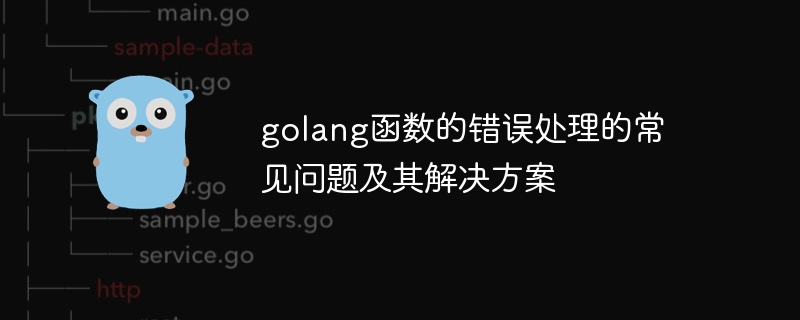
In GoLang, error handling is an important task, please pay attention to the following common problems and solutions: Ignore errors: Always check the error value of function calls and take appropriate actions as needed. Inconsistent error handling: Make sure function signatures and documentation clearly state the circumstances under which errors are returned, and force callers to check for errors. Unhandled errors: In functions outside the main function, use return errors or defer statements to handle errors to avoid panics.

In GoLang, error handling is a crucial aspect, which can ensure that the program robustness and controllability. However, in practical applications, some common error handling problems are often encountered, which may cause program crashes or unexpected behavior.
Issue 1: Ignoring Errors
Ignoring errors returned by function calls is the first error handling problem that GoLang developers often encounter. For example:
func readFromFile(file string) {
data, _ := ioutil.ReadFile(file)
// 忽略错误,继续执行
}In the above code, the ReadFile function returns an error value, which indicates whether the file read operation was successful. If this error is ignored, the program may crash if the file does not exist or cannot be read.
Solution:
Always check for errors and act accordingly if necessary. If the operation fails, you can return an error for the upper caller to handle, or you can use the if err != nil {} block to handle the error.
Problem 2: Inconsistent Error Handling
Another common problem is inconsistency in error handling between function callers and callees. For example:
func sendEmail(email string) {
// 假设此函数处理了错误并返回一个错误值
}
func main() {
sendEmail("user@example.com")
// 没有检查错误
}In the above code, the sendEmail function handles the error, but the caller does not check for errors. This may cause the program to crash if it fails to send the email.
Solution:
Make sure the function signature and documentation clearly state the circumstances under which an error is returned. Callers should always check for errors and take appropriate action if necessary.
Problem 3: Unhandled errors
In functions other than the main function, unhandled errors will cause panic and make the program collapse. For example:
func init() {
err := setupDatabase()
if err != nil {
// 未处理错误
}
}In the above code, if the setupDatabase function call fails, the program will panic before the init function returns.
Solution:
Always make sure to handle errors in a function outside of the main function. You can return an error for the upper caller to handle, or you can use the defer statement to handle the error before the function returns.
Practical case
The following is a practical example of handling errors:
func openFile(path string) (*os.File, error) {
file, err := os.Open(path)
if err != nil {
return nil, fmt.Errorf("failed to open file '%s': %w", path, err)
}
return file, nil
}This function opens a file and returns a file handle and possibly a mistake. If the file opening fails, the function returns an error with a detailed description of the error.
The above is the detailed content of Common problems and solutions for error handling of golang functions. For more information, please follow other related articles on the PHP Chinese website!
 How to solve 0xc000409 error
How to solve 0xc000409 error
 How to solve the WerFault.exe application error
How to solve the WerFault.exe application error
 How to define variables in golang
How to define variables in golang
 What are the data conversion methods in golang?
What are the data conversion methods in golang?
 What are the commonly used libraries in golang?
What are the commonly used libraries in golang?
 What is the difference between golang and python
What is the difference between golang and python
 Introduction to architectural drawing software
Introduction to architectural drawing software
 Usage of ModifyMenu
Usage of ModifyMenu




